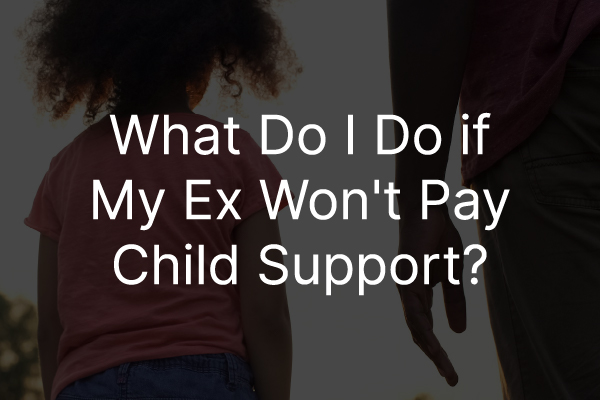What to Do when Ex won’t Pay their Child Support
 A separation can be stressful enough, but when you and your ex have a child together, things can get exponentially more complicated. One of the biggest stressors following a separation or divorce is that of figuring out child custody and child support arrangements.
A separation can be stressful enough, but when you and your ex have a child together, things can get exponentially more complicated. One of the biggest stressors following a separation or divorce is that of figuring out child custody and child support arrangements.
Unfortunately, if you’re keeping primary custody of your child, there is no guarantee that your ex will make timely child support payments—or that payments will be made in the full amount agreed upon.
If your ex fails to pay child support, it’s important that you know what steps to take and what common mistakes to avoid.
Review Your Court Order
Start by making sure you have a current court order for your ex to pay child support in the first place. This order should be signed by a judge and should outline, in very specific terms, how much your child’s other parent should be paying and how often. If you don’t have an official court order for child support payments, you’ll need to contact the court to begin that process.
Document Lack of Payment
Next, it’s time to document the other parent’s failure to pay child support. Generally, the best way to do this is to print out recent bank statements that prove you haven’t gained any child support money during the time period in question. If your ex has issued you checks that have bounced or were cancelled before you had a chance to cash them, hopefully you have kept these documented as well.
Consult With a Family Lawyer
Armed with a court order and documentation, your next move should be a consultation with an experienced family lawyer who specializes in child support and alimony payments. This family law attorney will be able to review your evidence and court order and then help you file a motion. Along the way, your lawyer will also be there to answer any questions you may have.
File a Motion for Enforcement
In most cases, your next step will be to file a “motion for enforcement” through the same court that signed off on the child support order. If you choose to file this motion, your ex will then be served with the motion for enforcement. However, depending on the circumstances, you may instead want to consider requesting an order to show, which will require your ex to appear in court.
These motions serve two different purposes. First of all, having a formal motion filed against your ex shows him or her that you’re serious about collecting on the back child support. Furthermore, it also documents that child support payments are late and allows the courts to intervene as necessary.
Explore Other Options
In some cases, a motion for enforcement or even an order to show won’t be enough to get your ex to pay you the child support that they owe. Instead, it may be necessary to take more severe action, such as seeking an income withholding order or wage garnishment order from the courts. This will allow for child support payments to be deducted from the other parent’s paychecks directly.
In some cases, asking for a lien on a property or requiring the sale of existing assets may be another option for you to gain back child support. Ultimately, your lawyer will be able to help you review your options and determine which course of action is best for you.
Keep Them Involved
One of the most important things to keep in mind when going through a child support dispute is that you need to keep your dispute separate from your agreed-upon visitation rights; you cannot prevent your ex from visiting your child just because he or she has failed to make child support payments. In fact, doing so can make it even harder to justify your case in court. Instead, your best bet is to continue keeping the other parent involved in your child’s life as much as has been agreed upon by a child custody order.
Schedule a Consultation Today
Failing to receive child support payments can be stressful—especially when you’re relying on the money to help with the basic costs of raising your child. A family lawyer will help you seek payment for the child support you’re owed in a timely manner so that you can move on with your life.
Schedule your consultation with Alison Grant, Attorney at Law today. Family law is one of her several practice areas, and she’d be happy to review your child support order to help you determine how to move forward. Call (972) 434-0021 to request your consultation in Lewisville today.






